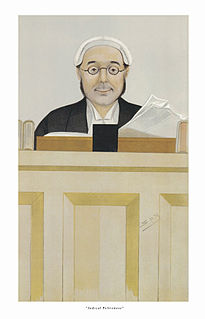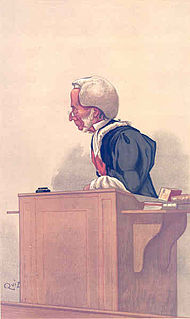Related Research Articles
Defamation is the oral or written communication of a false statement about another that unjustly harms their reputation and usually constitutes a tort or crime. In several countries, including South Korea, a true statement can also be considered defamation.
Bodily harm is a legal term of art used in the definition of both statutory and common law offences in Australia, Canada, England and Wales and other common law jurisdictions. It is a synonym for injury or bodily injury and similar expressions, though it may be used with a precise and limited meaning in any given jurisdiction. The expression grievous bodily harm first appeared in a statute in Lord Ellenborough's Act (1803).

Charles Synge Christopher Bowen, Baron Bowen, was an English judge.
New York Times Co. v. Sullivan, 376 U.S. 254 (1964), was a landmark decision of the United States Supreme Court ruling that the freedom of speech protections in the First Amendment to the U.S. Constitution restrict the ability of American public officials to sue for defamation. Specifically, it held that if a plaintiff in a defamation lawsuit is a public official or person running for public office, not only must he or she prove the normal elements of defamation—publication of a false defamatory statement to a third party—he or she must also prove that the statement was made with "actual malice", meaning that the defendant either knew the statement was false or recklessly disregarded whether or not it was true.
Coverture was a legal doctrine whereby, upon marriage, a woman's legal rights and obligations were subsumed by those of her husband, in accordance with the wife's legal status of feme covert. An unmarried woman, or feme sole, had the right to own property and make contracts in her own name. Coverture arises from the legal fiction that a husband and wife are one person.

William Baliol Brett, 1st Viscount Esher, PC, known as Sir William Brett between 1868 and 1883, was a British lawyer, judge, and Conservative politician. He was briefly Solicitor-General under Benjamin Disraeli and then served as a justice of the Court of Common Pleas between 1868 and 1876, as a Lord Justice of Appeal between 1876 and 1883 and as Master of the Rolls. He was raised to the peerage as Baron Esher in 1885 and further honoured when he was made Viscount Esher on his retirement in 1897.
Grievous bodily harm is a term used in English criminal law to describe the severest forms of battery. It refers to two offences that are respectively created by sections 18 and 20 of the Offences against the Person Act 1861. The distinction between these two sections is the requirement of specific intent for section 18; the offence under section 18 is variously referred to as "wounding with intent" or "causing grievous bodily harm with intent", whereas the offence under section 20 is variously referred to as "unlawful wounding", "malicious wounding" or "inflicting grievous bodily harm".
A mistake of fact may sometimes mean that, while a person has committed the physical element of an offence, because they were labouring under a mistake of fact, they never formed. This is unlike a mistake of law, which is not usually a defense; law enforcement may or may not take for granted that individuals know what the law is.

Balfour v Balfour [1919] 2 KB 571 is a leading English contract law case. It held that there is a rebuttable presumption against an intention to create a legally enforceable agreement when the agreement is domestic in nature.
In criminal law, consent may be used as an excuse and prevent the defendant from incurring liability for what was done.
Defamatory libel was originally an offence under the common law of England. It has been established in England and Wales and Northern Ireland. It was or is a form of criminal libel, a term with which it is synonymous.

D & C Builders Ltd v Rees [1965] EWCA Civ 3 is a leading English contract law case on the issue of part payment of debt, estoppel, duress and just accord and satisfaction.
The Ardlamont Murder, which took place in Argyll, Scotland, on 10 August 1893, gave rise to two high-profile court cases: a murder trial in Edinburgh, and a defamation trial in London the following year.
Modern libel and slander laws, as implemented in many Commonwealth nations as well as in the United States and in the Republic of Ireland, are originally descended from English defamation law. The history of defamation law in England is somewhat obscure; civil actions for damages seem to have been relatively frequent as far back as the reign of Edward I (1272–1307), though it is unknown whether any generally applicable criminal process was in place. The first fully reported case in which libel is affirmed generally to be punishable at common law was tried during the reign of James I (1603-1625). Scholars frequently attribute strict English defamation law to James I's outlawing of duelling. From that time, both the criminal and civil remedies have been found in full operation.
Polygamous marriages may not be performed in the United Kingdom, and if a polygamous marriage is performed, the already-married person may be guilty of the crime of bigamy under the s.11 of the Matrimonial Causes Act 1973.
Unconscionability in English law is a field of contract law and the law of trusts, which precludes the enforcement of consent-based obligations unfairly exploiting the unequal power of the consenting parties. "Inequality of bargaining power" is another term used to express essentially the same idea for the same area of law, which can in turn be further broken down into cases on duress, undue influence and exploitation of weakness. In these cases, where someone's consent to a bargain was only procured through duress, out of undue influence or under severe external pressure that another person exploited, courts have felt it was unconscionable to enforce agreements. Any transfers of goods or money may be claimed back in restitution on the basis of unjust enrichment subject to certain defences.

R v R[1991] UKHL 12 is a decision in which the House of Lords determined that under English criminal law, it is a crime for a husband to rape his wife.

The Libel Act 1843, commonly known as Lord Campbell's Libel Act, was an Act of the Parliament of the United Kingdom. It enacted several important codifications of and modifications to the common law tort of libel.

Sir Henry Manisty was an English barrister and judge.

National Westminster Bank plc v Morgan[1985] UKHL 2 is a judicial decision of the House of Lords relating to English contract law and the doctrine of undue influence. The case is most well known for the comments of Lord Scarman about the supposed requirement of "manifest disadvantage" to set aside a contract for undue influence.
References
- ↑ Defamation Lecture Notes.
- ↑ Wennhak v Morgan (1888) 20 QBD 635 at 639.
- ↑ Wennhak v Morgan (1888) 20 QBD 635 at 637.
| | This article related to English law is a stub. You can help Wikipedia by expanding it. |